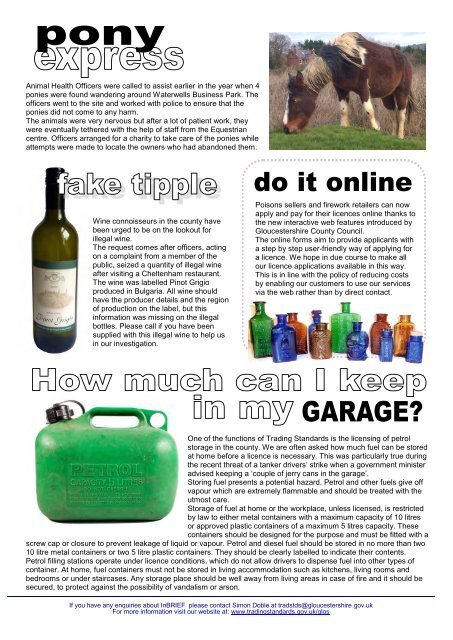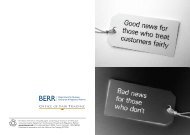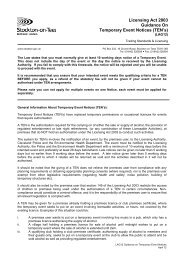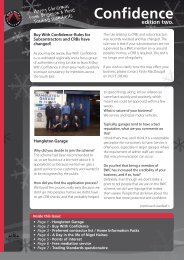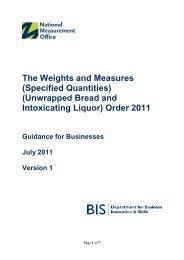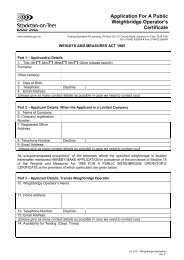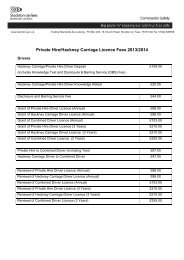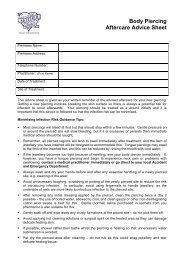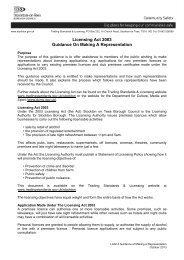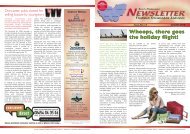Summer 2012 - Trading Standards Institute
Summer 2012 - Trading Standards Institute
Summer 2012 - Trading Standards Institute
Create successful ePaper yourself
Turn your PDF publications into a flip-book with our unique Google optimized e-Paper software.
Animal Health Officers were called to assist earlier in the year when 4<br />
ponies were found wandering around Waterwells Business Park. The<br />
officers went to the site and worked with police to ensure that the<br />
ponies did not come to any harm.<br />
The animals were very nervous but after a lot of patient work, they<br />
were eventually tethered with the help of staff from the Equestrian<br />
centre. Officers arranged for a charity to take care of the ponies while<br />
attempts were made to locate the owners who had abandoned them.<br />
Wine connoisseurs in the county have<br />
been urged to be on the lookout for<br />
illegal wine.<br />
The request comes after officers, acting<br />
on a complaint from a member of the<br />
public, seized a quantity of illegal wine<br />
after visiting a Cheltenham restaurant.<br />
The wine was labelled Pinot Grigio<br />
produced in Bulgaria. All wine should<br />
have the producer details and the region<br />
of production on the label, but this<br />
information was missing on the illegal<br />
bottles. Please call if you have been<br />
supplied with this illegal wine to help us<br />
in our investigation.<br />
Poisons sellers and firework retailers can now<br />
apply and pay for their licences online thanks to<br />
the new interactive web features introduced by<br />
Gloucestershire County Council.<br />
The online forms aim to provide applicants with<br />
a step by step user-friendly way of applying for<br />
a licence. We hope in due course to make all<br />
our licence applications available in this way.<br />
This is in line with the policy of reducing costs<br />
by enabling our customers to use our services<br />
via the web rather than by direct contact.<br />
One of the functions of <strong>Trading</strong> <strong>Standards</strong> is the licensing of petrol<br />
storage in the county. We are often asked how much fuel can be stored<br />
at home before a licence is necessary. This was particularly true during<br />
the recent threat of a tanker drivers‟ strike when a government minister<br />
advised keeping a „couple of jerry cans in the garage‟.<br />
Storing fuel presents a potential hazard. Petrol and other fuels give off<br />
vapour which are extremely flammable and should be treated with the<br />
utmost care.<br />
Storage of fuel at home or the workplace, unless licensed, is restricted<br />
by law to either metal containers with a maximum capacity of 10 litres<br />
or approved plastic containers of a maximum 5 litres capacity. These<br />
containers should be designed for the purpose and must be fitted with a<br />
screw cap or closure to prevent leakage of liquid or vapour. Petrol and diesel fuel should be stored in no more than two<br />
10 litre metal containers or two 5 litre plastic containers. They should be clearly labelled to indicate their contents.<br />
Petrol filling stations operate under licence conditions, which do not allow drivers to dispense fuel into other types of<br />
container. At home, fuel containers must not be stored in living accommodation such as kitchens, living rooms and<br />
bedrooms or under staircases. Any storage place should be well away from living areas in case of fire and it should be<br />
secured, to protect against the possibility of vandalism or arson.<br />
If you have any enquiries about InBRIEF please contact Simon Doble at tradstds@gloucestershire.gov.uk<br />
For more information visit our website at: www.tradingstandards.gov.uk/glos


